S. Scott Whitaker's Blog, page 17
October 5, 2013
Sally Zakariya has Insectomania

Field Recordings welcomes Sally Zakariya out of her internet wilderness into our wilderness. The fields mellow into gold around here, and the Indian Summer has settled to stay upon our fields and backroads. Welcome and explore. Links to Zakariya's work is peppered throughout.
Name:
Sally Zakariya
Pen Name: none, but thinking …
Most recent title published:
Insectomania (2013) and Arithmetic and other verses (2011), both from Richer Resources Publications, an independent publisher that specializes in translations of Greek and Roman classics but has recently added a poetry line.
Where do you write?
In my guest room/study, on an antique desk that was my grandfather’s.
What are your rituals with regards to writing (ex: Must have tea, a cat on the lap, etc.) Must spend a few minutes staring blankly out the window. Must have coffee. Must not let cat jump on keyboard, which can result in odd words.
Describe your writing process:
A poem usually begins with a single line or phrase that I fixate on before I go to sleep. I keep a pad and pen next to the bed, plus a little book light so I’ll be able to read what I scribble in the dark. This process works in revision, too—I’ll recite new lines to myself and jot down ideas that occur in the half-there state before I fall asleep. This can result in insomnia, but I think it helps my poems.
What do you when you begin to revise? What's the first thing you do during that process? The first step in revision is reading the poem aloud (quietly) over and over and noting glitches in sound and cadence. Then I look at line breaks. I print out the revision and keep a copy with me to read over while I’m fixing dinner or whatever. Usually at this point I spot things that simply don’t belong—a belabored metaphor, lines that really should be in another poem, and so on. And then I put the poem away in a “draft folder” and move on to something else. Some poems never make it out of the draft folder, some I revisit a number of times, and a few need just a few tweaks to graduate.
When revising, how many drafts do you go through before you feel comfortable with the final product? I typically go through at least 4 or 5 drafts and sometimes more, sometimes changing just one or two words. Sometimes axing whole chunks. Sometimes rearranging lines.
When arranging lines for your poems, what do you consider at the micro level about the line? (For example...I never end a line on the word “and” etc.) I think it’s important to (almost always) end a line on a strong word, whether the lines are enjambed or not. Because I pay attention to cadence (as opposed to formal meter), I don’t want a line to end on an auxiliary sort of word, like “in,” “and” “the,” etc. I also like to keep lines reasonably short—maybe because I’m an ex-smoker and short of breath.
As a poet, whose music, or voice, sometimes do you hear as you write or revise?
My husband, who’s a little deaf, plays classical music in his studio, directly below mine, so I’m often writing to a background of Beethoven, Mozart, Biber, etc.
How would you classify your poetry? Are you a lyric poet? A Romantic? A Surrealist?
None of the above—in fact, I have no idea how to classify my poetry, but people tell me it’s accessible and has layers of meaning.
What poets are you currently reading?
Philip Levine, Li-Young Lee, Sharon Olds, and Michael Dickman
What poets/poems do you strongly recommend a reader to discover?
I hesitate to recommend—everyone’s taste is different. I just suggest reading voraciously.
The contemporary American poetic tradition is elegy. Do you discover elegiac qualities among your own writing as a whole? Are you a poet of loss?
Any poet my age is a poet of loss, so I would have to say there are elegiac qualities in many of my poems.
Where does your inspiration come from (music, film, other books)?
My inspirations are primarily words—snatches of conversation overheard, phrases I’ve read, “creative mishearings”—and nature. I’m big on birds and insects.
What is your literary guilty pleasure? (trashy sci-fi adventures, bad romance novels, 50 Shades, fanfic, etc.) Murder mysteries by the bushel, especially if they’re from cold Northern places.
Explain how your local and regional environment influences your writing, your process, and your product (in other words, how does your reality intersect with the worlds that you create?): For the most part, my reality pretty much reflects the reality around me, but I do sometimes write poems that inhabit some sort of dream space.
You have to invite three authors to dinner, who are they? Why?
Whoever I’m reading at the time, so I can ask them the same kind of questions you’re asking me.
Favorite title (you wish you had come up with):
“Days in the History of Silence” – a novel by Merethe Lindstrom (I haven’t read it but plan to, on the basis of the title alone)
Line(s) you wish you wrote:
Memory revises me. (from “Furious Versions,” Li-Young Lee)
Book you did not read in high school but now have read and have an appreciation for: And why: Too many to pick from …
Favorite words:
Words that have a crackling, sparking kind of sound.
Least favorite words:
Sappy multisyllabic words that end in –ly.
Advice you would like to pass on to other writers:
Read, think, read, and share your work with others for honest critique.
What you would discuss with your pet if your pet could talk:
I’d talk to my cats about birds—why I write about them, why I’m glad they catch so few.
Published on October 05, 2013 03:00
October 4, 2013
Sabne Raznik goes for the Marrow
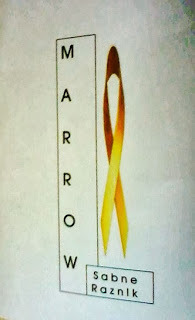
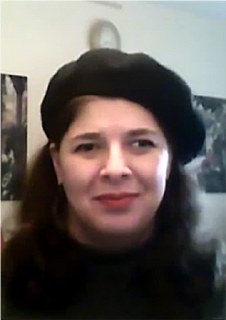
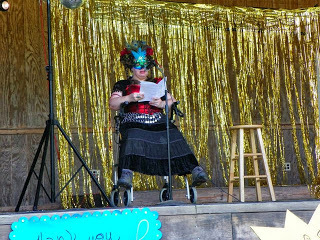
Amy Nicole McDougal is Sabne Raznik, and she has crafted a book to benefit Children's Cancer Awareness, appropriately titled Marrow. Please pass this link on throughout the internet wilds.
Name:
Amy Nicole McDougal
Pen Name:
Sabne Raznik
Most recent title published:
"Marrow", a limited edition art book to benefit Childhood Cancer Awareness and St. Jude's Research Hospital.
Where do you write?
I'm on the road a lot, so I can't really say I have a specific place. I do have a desk at home in a corner of my living room, and often I write in a journal book at the coffee table. Other than that, I write in that journal wherever I can. I often write during long car rides, and in the middle of the night.
What kind of poetic tradition do you see yourself coming from? (lyric, surrealism, realism, etc)
I suppose it would have to be lyric in terms of what I write.
The contemporary American "form" is elegy. How do you see your work fitting into that "tradition"?
I have written an elegy or two. The strict literary definition of the word, well, that has to be done carefully or it can come off as too sentimental or naïve. I think, for the most part, I tend to stretch the elegy into something written not just for the dead, but also for people who have merely left, or the end of significant relationships. I've also written elegies, if you like, for places or times, even for versions of myself that no longer exist. It's an important aspect of being a poet to always be looking for ways to stretch a received form or tradition while respecting it, and especially to stretch yourself. A poet never stops learning and never stops experimenting, even the most conservative poet. Although I am not at all a conservative poet, if you consider the regional tradition I inherited.
What are your rituals with regards to writing (ex: Must have tea, a cat on the lap, etc)
There usually has to be music playing somehow and not a lot going on - or at least not a lot that requires my direct participation. I need an atmosphere conducive to reflection. Poetry, for me, is largely a result of reflection and meditation. And when I say meditation, I don't mean the kind of mind-clearing meditation of Buddhism or anything of that sort. I mean deep thinking about life, occurrences, and things and making connections. When a person has thought something through enough to put it in words, and beyond - to put it in pictures which are then put back into words - a poem results.
What themes did you explore in this new collection?
These are poems that were all written during the time that my nephew was battling Acute Myeloid Leukemia with FLT3 gene mutation. He was diagnosed when he was 10 years old, but the advantage of hindsight and learning more about the cancer convinces me that he was sick for at least a year before being diagnosed. It was a truly horrific time. He eventually died just three weeks shy of his 12th birthday in 2010. I had two cousins, also firstborn sons, who died from the same cancer - one in the very early 80s and the other in the 90s. The book is meant to raise awareness for Childhood Cancers, that there is a desperate need for equal funding and safer treatments. The current situation is medieval. The poems, therefore, are, for the most part, frill-less, so to speak. There is one that follows my usual image-loaded style. The rest are straight-forward, raw, unapologetic. I suppose they come closer to the schools of realism and confessional poetry. They're meant to be hard to read, to hit like a kidney punch. They're a wake-up call. Generally, if people ask me to define poetry, I'll say it is fictionalised truth. But these poems are non-fiction. This is not a time to, as Seamus Heaney said in his poem "Station Island", "confuse evasion and artistic tact".
What was challenging about culling poems together?
The poems in "Marrow" came rather quickly, when they finally came at all. There was the challenge of organisation, as always. The greatest challenge was how to write about an experience that defies description. Poetry about illness is universally acknowledged to be difficult and full of pitfalls. Writing about Childhood Cancer takes that to a whole level unique to itself. I had to find a language that could look unflinchingly at an unimaginable reality and not degrade it or minimalise it or turn it into euphemism or sentimentalise it or, well, neuter it. But it also had to be a language that would not overwhelm or repulse.
What's your personal favorite? Why?
Dare a poet have a favorite within one's own work? Are there ethical principles against that sort of thing? From "Marrow", "Mrs. Albininah" is based squarely on a true experience. I changed the title character's name, of course. That story floated around inside of me for a couple years before it matured into something that could be written down. I hope this woman's story will mean something to people, as it does to me. I carry her inside me everywhere I go.
Describe your writing process:
What do you when you begin to revise? What's the first thing you do during that process?
I revise even as I'm writing. The first thing I consider is the images. Are they clear? Do the chosen words convey them accurately and strongly? I usually want my poems to be very visual. Some critics have compared them to paintings. Also, I tend to write my poems in pieces and then fit them together later like a puzzle, so that most of the process involves organising. I respect the fact that poetry is both written and oral/aural, so I let the ear decide when a poem is finished. Sometimes it comes in a flurry and sometimes it's a long, painstaking process. The last thing I do is go through and see how many of the articles (definite and indefinite) can be eliminated.
When revising, how many drafts do you go through before you feel comfortable with the final product?
I let the poem tell me when it's ready. As I said before, sometimes it comes in a flurry and only one or two drafts are needed. I once wrote a poem that had so many drafts it filled up over half of a journal book. The evolution of manuscripts can be much the same.
What poets are you "borrowing" from, or riffing from these days? Do you hear these "voices" as you revise or write?
Seamus Heaney is always a voice in my head, and U2. Music is as important to me as literature. To me songs and poetry are often the same, especially if the lyrics are very well written. I think I have quoted Radiohead, Eliot, various Moroccan poets. I have very much a Biblical imagination, so the Bible is ever present. There are many, many more.
Where does your inspiration come from (music, film, other books)?
Everything in the parentheses there. *laughs* Everything that a writer sees, speaks of, experiences, and dreams becomes part of his/her toolbox. Which makes people uncomfortable, I've noticed, because they seem to be always quick to ask "Was this poem about me?" To which I can only reply "Bless your heart." I love cultural studies and languages. I have dabbled in about 20 languages other than my native tongue, though I am far from fluent in any of them. Want to shift your perspective on the world? Study a different language. There is no end to the inspiration that can be drawn from that kind of thing.
Explain how your local and regional environment influences your writing, your process, and your product (in other words, how does your reality intersect with the worlds that you create?):
I used to live on a mountaintop, so there were a lot of trees in my poems. I've since moved to the county seat (a small town) and my recent poems have a slightly more urban feel. The regional tradition I inherited is the unique Appalachian literature. It is generally very pastoral, ancestor-obsessed, religious, sentimental, and largely written in a limited number of rigid, conservative rhymed forms. I used to refer to it as Greeting Card verse, because that's what it reminds me of. In school, we were taught some Shakespeare and a number of the Romantic poets and the Confessional poets (Sylvia Plath, Anne Sexton), but 20th century literature was ignored for the most part and even the teachers didn't seem to be aware of World poetry or poetry in translation. Exposure to these things comes only as a result of the growing availability of the internet (although there are still some places where the internet is just something mentioned on television). Therefore, being autodidact is vital, but not generally encouraged. But in the last 40 years in particular, Appalachian culture has been bombarded by an artillery of influences wholly new to it due to the growing proliferation of various media. As more and more reach out, this has resulted in a destabilization of the culture where it remained mostly unchanged for 500 years prior to this. The area is becoming less and less isolated as new roads are built. The local newspaper announced a few weeks ago that the private airport at the county seat will begin its first commercial flights in a year or so. This creates an exciting and dangerous moment where the Appalachian culture and people can either hold its own and become more respected on the world scene or collapse and completely assimilate into the dominate culture of the country. It's also more than abundantly clear that the literature needs to be updated to reflect this moment. I have in the past referred to this moment in Appalachian history as a Regional Modernism. Myself, and a handful of poets that I know about (there are likely more that I'm not aware of yet), are attempting to modernise Appalachian literature. But since this is such a potentially disastrous moment for the culture we have inherited, it is important that we move forward with a profound respect for what came before us. We may not agree with that Greeting Card verse-like practice and we do not write that way ourselves, but we must respect it and proceed with caution. We do not wish to lose the unique culture that bred us. Indeed, we wish to preserve it and promote it even as we update it. It is vital that we do not throw the baby out with the bathwater, so to speak.
What's your literary guilty pleasure (sci-fi, 50 Shades, westerns, etc)?
Tolkien and the various mythologies of the world. Books about horses.
You have to invite three authors to dinner, who are they? Why?
You didn't indicate whether these should be living or dead, so I assume they can have fallen asleep in death. Seamus Heaney, obviously, because he is a poet who defined me, and I would very much love to have the chance to get to know the man better, to learn from him and his qualities. And I think contrasts are always interesting to have in the same room as long as there is mutual respect, so Kit Fryatt. She is doing things that, while not necessarily innovative in terms of American poetry, are extremely much so for Irish poetry. She has an interesting background that spans several countries, and I should like to learn from that. She doesn't care for Heaney's work at all, but I believe she could tolerate his company for a night and that fact might make for lively conversation around the table. Also, she has championed my work in Ireland and Scotland and been for all intents and purposes a generous mentor, but we have never met in person. So I couldn't have a literary dinner party without including her. And I would invite a fellow poet from my hometown, Artemis Blithe. We have more or less the same goals for Appalachian literature, although we write differently (we're both experimental for the tradition we inherited) and read differently, and it might be a good opportunity for him to learn as well. I'm positive he would also have a great deal to contribute.
Favorite title (you wish you had come up with):
"Whethering". I thought I had come up with it, actually. I had intended to call my second full length collection "Whethering: shiir". Shiir means "poem or song" in Arabic. And the word "whethering" (which I mistakenly thought I had made up) was a perfect description of the mood of the manuscript, being a kind of pun on weathering a storm and an uncertain, unstable wavering between choices. But circumstances caused a delay of publication. In the meantime, another poetry collection, I forget which poet, came out with that name and I discovered it had been used several years before by another. It's a clever word and feels nice in one's mouth, so I'd hate for it to be overused. I tried out several other titles after that, though none seemed to suit it as well, and I finally settled on "Linger To Look", which is a kind of variation on the translation of an Andrea Bocelli lyric. Circumstances continue to delay publication, although, of course, I hope it won't take much longer.
Line you wish you wrote:
Goodness, there are so many I could not possibly pick one to answer this! Anna Akmatova's "Requiem", Stanley Kunitz' "The Layers", Caroline Forché's "The Island", the list goes on and on. And if you include songs in that, we could literally sit here all day. *laughs*
Book you did not read in high school but now have read and have an appreciation for: And why:
There are also so many. "Moby Dick", all of James Joyce's work, "Uncle Tom's Cabin", so many classics and a whole world poetry. "Hamlet", I have learned to love "Hamlet" as much as or more than "Romeo and Juliet".
Favorite words:
Love. Hope. Faith. Future. Fabulous. I'm told I use Awesome almost constantly. And there's just something special about the word Chicago if divorced completely from its meaning and the city. Standing alone, it's like aural chocolate.
Least favorite words:
Labels. You know, those loaded words with negative connotations that people use to cause pain.
Advice you would like to pass on to other writers:
Don't look for short cuts. Learn your craft from the ground up. Proofread obsessively and put in the work. Earn your credentials. Always respect those who came before, even if you are extremely Avant Garde. But don't study so much that you become a mere copy-cat. Be generous and humble, and believe in your work. Eventually, then, others will, too.
Beatles or the Stones? Elvis or Cash?
All of the above. I have great respect for all of them. But if I absolutely have to choose: The Beatles and Cash.
What you would discuss with your pet if your pet could talk:
They would probably have a lot to say about how annoying I am. *laughs*
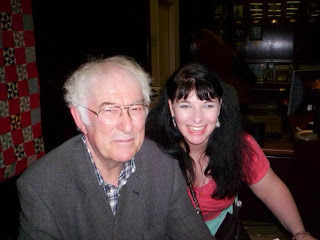
Published on October 04, 2013 06:00
September 27, 2013
Jeff Hirsch is on the Darkest Path
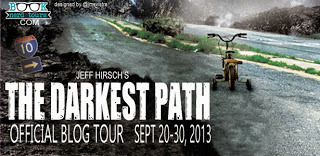
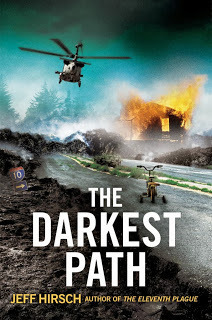
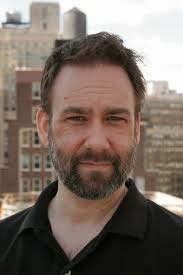
Field Recordings welcomes Scholastic Press' Jeff Hirsch, who is currently blog touring in support of The Darkest Path. You can read my review of The Darkest Path here, originally published by The Broadkill Review.
Jeff Hirsch
Most recent title published: The Darkest Path
Love that Cal is a dog catcher in the first act, how that shows us how dehumanized he is. Couple that with the brutal way he is beaten, and we start off with a hero who doesn't have a chance. You put him through the wringer. He continues to go through the wringer. What were you thinking in terms of heroic feats with this young man?
Well, the most important thing to me is that he wasn’t a hero, at least not at the beginning. I think Cal’s just a kid who wants to get back home and is willing to do whatever it takes to get there. In a way he’s as much of a fanatic as anyone in the Path, in that this single desire overrides everything else in his life. I think his journey is about moving away from self-obsession and seeing that he has a role in and responsibilities to other people and the larger world. Once he realizes that then he’s able to do things that are more heroic.
The Path. Tell me you didn't enjoy playing around with the fanaticism of the metaphor. What went into that recipe?
You know how you often hear people say, when talking about a politician, (usually a fairly extreme one) “I don’t agree with everything he’s saying but at least you know where he stands.” I was thinking about that a lot. The world is a chaotic and dangerous place and we have a tendency, as a country, to be pretty fearful. So it’s incredibly comforting to see someone who doesn't seem conflicted, who seems to know what they want and where they want to go. Someone with a plan. It can be so comforting that sometimes we’re less curious than we should be about the details of that plan. If it seems like it’s something that can take chaos and make it into order, or take complexity and make it into simplicity, we’re ready to sign up. And in a way it’s hard to fault people for that. It’s a normal human desire it can just lead to some pretty awful things.
You have explored being an outsider through the lens of family, of race, of belief; your characters are often outsiders, what is so fascinating about being on the outside looking in? There’s so much dystopian drama out in the world. What popular entertainment are you watching? What is it about the rags of the world that we find so fascinating?
Honestly, I read and watch almost none of the sci-fi dystopian stuff out there. After The Road, Hunger Games, How I Live Now, Rootless and Y: The Last Man, I got my fill. Most everything else, even when very well written, seems like a retread.
Why do we find that stuff so interesting? A lot of reasons I think. One is that it puts characters right on the edge so it’s tailor made for intense, high stakes storytelling. Outside of that I think we’re in a place right now where the world feels overstuffed and overstimulating and so mediated by technology that a lot of us feel like we’ve lost touch with basic human needs. Food, water, fire, shelter, human connections. Look at the DIY movement going on now. People are canning and knitting and sewing and cooking again. I think we feel this urge to put our hands to our own survival. Post-apocalyptic and dystopian literature feeds into that desire by stripping away the modern world and giving us one that seems simpler or at least more straightforward. In these worlds characters have to rely on themselves, on their skills and their bodies and their wits to survive. As dark as a lot of these worlds are they’re wish fulfillment in a way.
As for popular entertainment I’m a huge fan of Colbert, Breaking Bad, Mad Men and Game of Thrones. Also really looking forward to Agents of S.H.I.E.L.D., mainly because if Joss Whedon is involved, I’m there.
Tell us about Hill, what went into this man’s psyche? Did you model this character on any contemporary figure?
I wanted to make sure that he was a guy who was absolutely certain that he was the good guy in the story. He sees what he’s doing as the only way to save a badly broken world. He sees himself as acting out of love, not anger or hate. I hoped to create a guy who was smart, sensitive and thoughtful, a guy you would love to hang out with, all the while he was doing absolutely monstrous things.
I was reminded of the Odyssey reading this book, perhaps all of the Ithaca references, did you model this book on The Odyssey or Conrad’s Heart of Darkness?—the suffering reminds me of how one can never go home again…
I was definitely thinking of The Odyssey. It’s actually a large part of how I conceptualized the story in the early days, to the point that many of the incidents in TDP were directly inspired by incidents in the Odyssey. The part with the theater kids at that luxury compound came from The Lotus Eaters section of Odyssey, the part where Cal and the kids have to walk through the war zone was inspired by Odysseus in Hades. It ended up that those incidents are so loosely adapted that it’s unlikely anyone would ever notice, but that’s where the seed of the ideas came from.
Drone strikes. I love the fact that this book is both futuristic and topical. What’s your take on the use of drones? Is this more abuse of power?
Ugh. Drones. I’m conflicted. On one hand, I’m a realist. We’re going to be getting into violent conflicts with other countries and when we do I want as few of our people to die as possible. That said, the idea of war that can be waged without consequence to us, without any of our blood in the game, is incredibly dangerous. It just makes it way too tempting to lob bombs at problems. So while I can totally see their utility, I fear that using them requires more thoughtfulness and restraint than we seem to have.
What’s next for you? What’s cooking in the kitchen?
A lot, happily! I’ve got a book for younger kids coming out in January, called Breakaway. It’s the second book in the final run of the 39 Clues series. Other than that I just finished the first draft of another YA book, currently titled Black River, that I’m hoping will be out next fall. Can’t say too much about it yet other than it concerns a small town that has been quarantined for a very strange reason….
What are your rituals with regards to writing (ex: Must have tea, a cat on the lap, etc)
I actually try very hard not to have any rituals. Sometimes a deadline demands that you write in a hotel room or an airport, or on a train so I think it’s a good idea to need as little as possible in order to write. The only thing I like to have is my headphones and a good connection to Spotify so I can drown out the world with my writing playlist, which is mostly ambient/classical background music, lots of Phillip Glass, good move soundtracks etc.
Describe your writing process:
Does fumbling in the dark count as a process? Seriously, I admire/am incredibly jealous of writers who seem to have a set process. It must be so comforting to know that if you do X and then Y and then Z you have a book. For me I get a general idea and then work out a rough structure of how I think the story will go. Once I start though that outline largely gets tossed out the window. For me, the first couple drafts are all about figuring out what the hell the story is about, who the characters are and what I’m trying to say with it. The next drafts are all about deepening and sharpening those things as best I can.
What do you when you begin to revise? What's the first thing you do during that process?
The first thing I do is step away. Ideally I’ll set the book aside for a couple weeks and work on something else. (I’d like to set things aside for longer, but after two weeks I get seriously jittery and dive my wife crazy) The goal is to get it out of my head to the point that when I come back to it it’s this strange half remembered thing. Once I come back I always tell myself that I’m going to sit down and read the whole thing without making an changes or notes. Just experience it. I never actually do this. I always start at the beginning and work my way through it, applying insights I had over the course of writing the book to earlier scenes, cutting out the obvious bits of flab and sharpening character and relationship arcs. It’s a long period of refining, little by little, draft after draft.
When revising, how many drafts do you go through before you feel comfortable with the final product?
Honestly? I’m never satisfied. I could rewrite forever. I’m a big believer in that old adage about how a book is never finished only abandoned.
What writers are you currently reading? I’m all over the place lately. I just finished the most recent Game of Thrones book (pretty good but largely felt like place setting for what’s to come) and am now reading Leviathan Wakes, a big space opera that so far is pretty great. Looking forward to reading Tom Perotta’s book of short stories, Reza Aslan’s Jesus book and Jason Mott’s The Returned.
What writers do you strongly recommend a reader to discover?
I think I’m more an advocate of books than writers. If you’re interested in getting into really good YA I’d suggest: Eleanor & Park (Rainbow Rowell) How I Live Now (Meg Rossoff), Black Helicopters (Blythe Woolston) and Endgangered (Eliot Schrefer). I’d also say that you should read anything by MT Anderson, David Almond, David Levithan, KL Going and E. Lockhart.
Where does your inspiration come from (music, film, other books)?
So far all of my books have been inspired, in one way or another, by the political state of our country and the world. I watch the news, read the papers, and get angry to the point that I want to write something. The funny thing is that my books themselves aren’t all that political but often that’s where the spark comes from.
Favorite title (you wish you had come up with): The Knife of Never Letting Go by Patrick Ness. Sure it’s a really good book, but that title, man. It’s so unexpected. I love how the hardness of the first half flows into the more vulnerable, emotional second half. It’s a perfect little poem.
Advice you would like to pass on to other writers:
The screenwriter William Goldman once said about the movie industry: “Nobody knows anything.” What he meant was that no one, not even the most savvy and experienced movie execs, ever really knows what will be successful. Movies with everything going for them flop and huge successes come out of absolutely nowhere. The same is true for books. So given that no one can ever tell you for sure what readers or agents or publishing houses will want the only thing to do is write what you want to write. Maybe it’ll connect with people and maybe it won’t but at least you’ll succeed or fail on your own terms.
What you would discuss with your pet if your pet could talk:
Well, for one thing I’d talk to the cats, not the dog. Dogs aren’t very mysterious. With the cats I’d really like to know how they see the relationship we’re in. What are me and my wife to them? Surrogate parents? Companions? Strange hairless apes who sometimes forget to clean the litter box and make them SO MAD!? Do they love us in their weird kitty way? Are they happy? I think mostly I’d like to know that, if they’re happy.
Published on September 27, 2013 03:00
September 21, 2013
Shea Garvin Knows Where Night Comes From
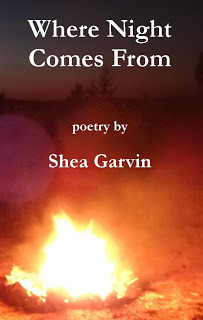
Field Recordings welcomes Shea Garvin to the internet wilds. Shea and I share a small press publisher, The Broadkill Press, and his newest, Where Night Comes From, is one of the Key Poetry Series chapbooks published this summer.
Name: Shea Garvin
Pen Name: The same
Most recent title: Where Night Comes From
Where do you write? Everywhere. Bars, Campsites, Airports. I do the revisions at home .
How do you classify yourself as a poet? I don't tend to think in those terms, categorizing. If I was to pick , it would be lyrically surreal and brutally romantic.
The contemporary American "mode" is elegy, where do you find yourself w/r/t to this "tradition"? I do find myself writing about death quite a bit , its a matter of fact sort of thing with me. I mean , we all die and spend vastly more time dead than alive so of course its something to explore.
Do you have any rituals when it comes to writing? Black ink. I can't seem to turn a phrase with a blue pen.
What themes did you explore in this collection? Any challenges in culling them together? This collection covers about 15 years or so of writing, themes? I leave that up to the reader. As far as culling them together, I'd have to thank Jamie Brown for that.
Favorite poem from the collection? Bones and Grit. Its has a rhythm that I'm particularly fond of for readings . It sounds ferocious , almost menacing .
What's your inspiration? Erratic.....There is a quality to certain moments in life that just beg to be described or made art. Think of "Raging Bull" with Robert Deniro, in that movie there is a scene where Deniro is watching his love interest splash her feet in the pool and everything slows down and became a poem. those are the moments that make it i to my notebook. When I feel that heightening of senses , or get that wave of melancholy , all kinds of things can set it off.
Revision process? First thing I do is go through and cross out all of the "the"s . Then I look for cheap trickery and beat it i to shape. Then I scratch out all the ands . Then I put back the "the"s and "ands" I cant live without and see how it lays on the page and how it sounds out loud.
I do't go through too many revisions, I find it stiffens the words.
Who are your inspirations? Saul Williams, Denis Johnson, Tom Waits , Charles Bukowski, Jim Carroll, Robert Frost, Jack Kerouac. I'm sure there's more. It all gets assimilated.
Guilty pleasure(s)? I have a love of bad horror movies. Not the mainstream stuff, but really B studio type stuff.And good Sci-Fi . And I've read just about everything Louis L'Amour wrote. I make no apologies.
You have to invite three authors to dinner, who are they? Why? Cormac McArthy , Stephen King , Bram Stoker. I'd bring McCarthy for the language he carries with him, a true master of making you uncomfortable. Stephen King for his limitless worlds and Stoker just because.
A Line you wish you wrote? Great Big Ugly Man Came Up And Tied His Horse To Me- its a book of nonsense verse illustrated by Wallace Tripp.
Favorite words: ummm
cant think of one , I read everything they threw at us back then. Still have a soft spot for "the Black Pearl" I could just feel the boy's stress when the pearl's inclusion was being cut , after all that, it could have been ruined.
Gesticulate, bifurcate, fuck. The first two are just fun to say, and the last is just so damn useful.
The words i hate I won't write here, but they fall under the umbrella of ignorance.
Advice you'd pass on to other writers: While observing, don't forget to do as well. Live it so you can better understand. Get personal, this is nothing new but I will say it again. The more personal and particular you get , the broader the appeal. Everyone has the same things going on in their lives,even the most trivial of things can be poignant from the right angle.
Never give up, unless you suck and you know it deep down where the truth hides. If that's the case, quit now. Save yourself and those around you from limp prose.
Beatles or the Stones? Elvis or Cash? The Doors and Cash
What you would discuss with your pet if your pet could talk: Um, Where's my boots?
Published on September 21, 2013 03:00
Nina Bennett makes Sound Effects
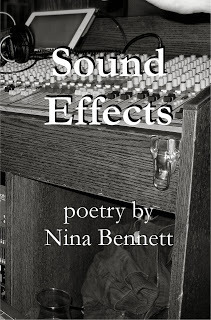
Field Recordings welcomes Broadkill poet, Nina Bennett to the internet wilds. Nina shares the same small press home as I do, the very kind and suave Broadkill Press, an imprint of The Broadkill River Press, and The Broadkill Review. Nina's launching her book on Sunday Sep 29 at the Arden Craft Shop Museum, in Arden DE, from 1-4. As usual links are peppered throughout. Nina is also a member of a writing group, which has a home here.
Name: Nina Bennett
Pen Name: N/A
Most recent title published: Sound Effects
Where do you write?
Most of my writing starts in a spiral-bound notebook before it gets anywhere near the computer. I find it easier to write at home than at a local coffee shop. I do a great deal of writing when I am out of town-hotel rooms and airports. I’ve been known to write on napkins in bars.
What are your rituals with regards to writing (ex: Must have tea, a cat on the lap, etc)
Music-60s rock.
Describe your writing process:
Most drafts start in my head, while I am in my car. It may be a song title, lyric, or a line that I just can’t get out of my brain, so eventually I give in and start writing.
What do you when you begin to revise? What's the first thing you do during that process?
I look at nouns and verbs. A wonderful exercise I learned in a workshop with Molly Fisk is to make a list of all the nouns in your poem, then list substitutes. Then do the same thing with verbs. Push yourself to find the strongest nouns and verbs. Don’t walk-sprint, sashay, prance-but don’t walk. Get rid of adverbs and adjectives. Get rid of as many “and” and “the” words as possible.
When revising, how many drafts do you go through before you feel comfortable with the final product?
At least 10
When arranging lines for your poems, what do you consider at the micro level-- about the line? (For
example...I never end a line on the word “and” etc.)
powerful end words, internal/slant rhyme
As a poet, whose music, or voice, sometimes do you hear as you write or revise?
Jim Morrison
How would you classify your poetry? Are you a lyric poet? A Romantic? A Surrealist?
Narrative poetry, poetry of loss
What poets are you currently reading?
Joan Colby, Jack Coulehan, Tony Goeggler
What poets/poems do you strongly recommend a reader to discover?
Contemporary female poets: Molly Fisk, Ellen Bass, Diane Lockward, Kimmy Beach, Daisy Fried, Erin Belieu, Kim Addonizio, Bobbi Lurie, Erika Meitner, Denise Duhamel
The contemporary American poetic tradition is elegy, do you discover elegiac qualities among your own writing as a whole? Are you a poet of loss?
I think there are many elegiac elements in my poems, and I am most certainly a poet of loss.
Where does your inspiration come from (music, film, other books)?
Music, the 60s, not-so-current events, family
What is your literary guilty pleasure? (trashy sci-fi adventures, bad romance novels, 50 Shades, fanfic, etc.)
True crime
Explain how your local and regional environment influences your writing, your process, and your product (in other words, how does your reality intersect with the worlds that you create?):
Interesting question. I’ve been reading the series in Poets and Writers on this topic, and my local/regional environment doesn’t resonate with me at all. I live in Delaware, in the upstate suburban sprawl part of the state. I don’t consider myself to be a city poet, or a beach poet. Actually, my Mid-Atlantic regional environment influences my writing in the sense that I do my best writing when I travel away from the Northeast.
You have to invite three authors to dinner, who are they? Why?
I would never be able to sit through a meal with 3 people, but I’ll be a good sport and answer. Leonard Cohen, because I could listen to his voice forever. Will Schwalbe, because he’s not afraid to talk about death.
Favorite title (you wish you had come up with): I Have to Go Back to 1994 and Kill a Girl (Karyna McGlynn). Isn’t that a delicious title? How could you walk past a book with a title like that?
Line(s) you wish you wrote: Too many to quote
Book you did not read in high school but now have read and have an appreciation for: And why:
Being oppositional-defiant, I am going to answer in the reverse. I read the classics in high school and wish I hadn’t used my time that way. Heresy, I know! Please don’t throw things at me.
Favorite words: jasmine, fuschia, riff, iridescent,
Least favorite words: last call
Advice you would like to pass on to other writers:
Read. Read. Read. Then read some more.
What you would discuss with your pet if your pet could talk:
Ah-the point of having a pet is that they don’t talk! My secrets are safe.
Published on September 21, 2013 03:00
September 20, 2013
Vargus Pike hears April Songs
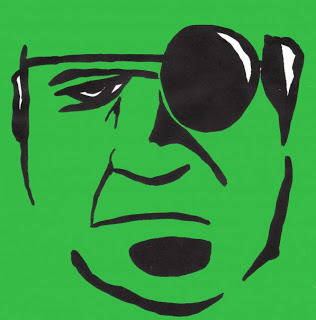
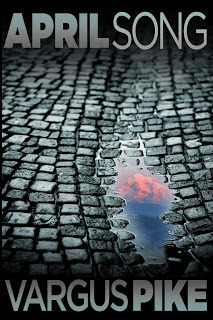
Vargus Pike is the author of April Songs, a collection inspired by National Poetry Month. Many writers write a poem a day in April to celebrate their craft. As usual, links to his work is throughout. Thanks for seeking us out.
Name: Vargus Pike
Pen Name: Vargus Pike
Most recent title published: April Song
Where do you write? A:Often like Marat I prefer the tub, at other times I write while driving or walking using a recorder, sometimes too I sit in front of the television and completely ignore it while I work.
What kind of poetic tradition do you see yourself coming from? (lyric, surrealism, realism, etc) A:Difficult to say. My poetry much like my life has gone through phases. There was a time when I preferred realism to lyricism. There was a surreal phase. Now I just write what I feel and do not worry so much about form. The subject matter and the mood tell me what to write
The contemporary American "form" is elegy. How do you see your work fitting into that "tradition"? A: I believe that meter and rhythm are essential to poetry. It is not an accident that poetry fits so well with music. It is not an accident that a chorus that sings together have heartbeats that align. Life is all about rhythm and poetry is an expression of that life. How can our poetry not have meter and rhythms within rhythms in the line and between lines. Even in modern forms of free verse there is always some form of meter there if you look for it hard enough.
What are your rituals with regards to writing (ex: Must have tea, a cat on the lap, etc). A: I do not really have any other than when I am blocked a hot bath opens my mind along with my pores and I inevitably sweat something out.
What themes did you explore in this new collection? What was challenging about culling poems together? A: My book April Song was the challenge. I wrote thirty poems in the thirty days of April. The rules I set myself were 1) The theme of each poem was not even contemplated until the day it was written and 2) Before I went to bed the poem had to be in a complete presentable form. My themes ranged in scope from nature to the exploration of the nature of time, from love to death, humor and tragedy. Nothing was off limits.
What's your personal favorite? Why? A: You know I hate it when someone asks me to choose which child is my favorite. Much of the time it depends on who is acting up that day and who is behaving. It all depends on mood and perspective. Some poems I love as soon as they are born but then grow tired of them. Others I think are ugly or stupid and then later they seem to grow and blossom into something I never knew they were.
Describe your writing process: A: Much of the time I start with a phrase that pops into my head. The poem in the book titled "April Third" was started that way with the opening line "Sunrise silhouettes Cascadia." The poem then unfolds from there. Another example of that was the poem that starts "We hid in the root cellar when the big winds came" I have no idea where that came from but before the day was done there was a complete story behind it. At other times I start with a theme and then build a poem around it testing lines until I have said what I feel compelled to say.
What do you when you begin to revise? What's the first thing you do during that process? A: Revision is a demon from the eighth circle of hell. If you allow it to get a hold of your poem it will never let go so I try very hard to do as much as possible to finish a poem to my satisfaction the first time. When I write I am very conscious about structure, rhythm and sound. I may start out the first draft on paper if I am not near my word processor but then when I can, I go to the computer and start moving things around looking for that balance between the three. I knead the words like bread dough until they begin to rise on the page. I also read them out loud first to myself and then to my wife, my kids or even the cat. Not for their benefit but for mine. I think you read and see things differently when you are performing a poem instead of reading one. I find a lot of my mistakes that way.
When revising, how many drafts do you go through before you feel comfortable with the final
product? A: As few as possible. Once I declare a poem finished I like to set it down for a few days so I can have "fresh eyes" on it then I do a read through. Rarely I change more than a word here or there. Mostly I tinker with punctuation and spacing on the page. Then I walk away as quickly as I can.
What poets are you "borrowing" from, or riffing from these days? Do you hear these "voices" as you revise or write? A: I hear voices a great deal of the time but they are not anyone I recognize. Just audible thoughts and whispers in the dark recesses of my mind. As for poets William S Burroughs inspires me as does Shakespeare. Listening to Gertrude Stein taught me a few things as well.
Where does your inspiration come from (music, film, other books)? A: Pretty much life inspires me. Hopes, dreams, experiences, life changing events. We write what we know and what we have seen, only the scenery changes to suit our ennui.
Explain how your local and regional environment influences your writing, your process, and your product (in other words, how does your reality intersect with the worlds that you create?): A: Mainly I use it to gather inspiration. If I were still living in the Appalachia region instead of Cascadia then I would have written "Sunrise silhouettes Appalachia" and gone on to describe that scene. Living outside of Portland I find I write a lot of poems about rain.
What's your literary guilty pleasure (sci-fi, 50 Shades, westerns, etc)? A: I used to read a lot of Earle Stanley Gardener, Perry Mason pulp fiction but lately I am too busy writing to read much except other peoples manuscripts in progress.
You have to invite three authors to dinner, who are they? Why? A: They are all dead so It would not be much in the way of dinner conversation but here goes. William S Burroughs because I absolutely love his voice. He had a delivery like none other I have ever heard. Oh that drawl. Kurt Vonnegut so I could talk style with him and Aldous Huxley because of his dust dry wit.
Favorite title (you wish you had come up with): A: Sweet Thursday (Steinbeck)
Line you wish you wrote: A: "He was a sad poison nice guy more poison than nice." (Burroughs)
Book you did not read in high school but now have read and have an appreciation for: And why: A:The Old Man and the Sea; Hemingway used such simple language and it is more like a novella than a novel in length by today's standards yet he said so much. The book is rich in imagery and feeling. Poetic prose to my mind.
Favorite words: A: Splarg and Glarbnaster are my favorite words right now. You wont find them in a dictionary so don't bother.
Least favorite words: A: Conformity and Surrender
Advice you would like to pass on to other writers: A: Pretty simple, Don't be afraid to suck. When I go back and look at some of my early writing I cringe but I never would have reached the point I am at if I had been afraid to try. That's how we get better. Very few people write their best stuff right out of the chute. It takes time and practice and courage so get out there and do it.
Beatles or the Stones? Elvis or Cash? A: Beatles yes, Stones not so much. As for Elvis and Cash. Who knows where Elvis would have wound up if he hadn't gotten ruined by his manager. He had excellent musical tastes and could really act, though he was never give the chance to do serious roles. I also love Cash. That power of that voice could cut through steel and I have yet to hear something of his I don't like. I call that one a tie.
What you would discuss with your pet if your pet could talk: A: My cat and I talk every day. Animals all communicate much more than most people give them credit for. Poster Nutbag tells me what he wants and what he needs. He tells me when he is happy, bored or super pissed off at me. He also knows when I am upset or ill or lonely. I do wonder if he sees ghosts.
Published on September 20, 2013 03:00
September 15, 2013
The 360 Degree Heart, Maja Dezulovic Discusses Her Writing Life
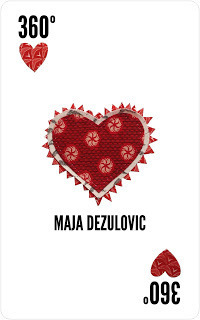
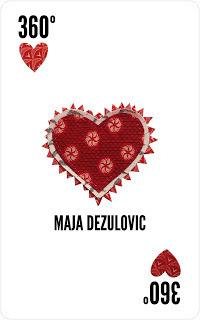
Field Recordings welcomes poet Maja Dezulovic to the internet wilds. Links lie throughout. The fall approaches.
Name:
Maja Dezulovic
Pen Name:
I use my real name.
Most recent title published:
The 360 Degree Heart
Where do you write?
I write at home mostly.
What are your rituals with regards to writing?
I like listening to music or reading first for inspiration. Sometimes writing spurts come after a long journey or trip.
Describe your writing process:
I start by jotting down ideas. Those ideas or keywords then become whole phrases, which turn into poems. The poems then become the basis for short stories or novels.
What do you when you begin to revise? What's the first thing you do during that process?
I look to see if my writing flows naturally and logically. That is, how does it sound like when read aloud? I believe that good writing has musical aspects to it. I change the flow by rearranging paragraphs and sentences. Then I look for any spelling or grammatical errors.
When revising, how many drafts do you go through before you feel comfortable with the final product?
I usually go through two or three drafts.
When arranging lines for your poems, what do you consider at the micro level-- about the line? (For example...I never end a line on the word “and” etc.)
I consider flow to be the most important element of my poetry. Poetic licence dictates that there are no rules so I don’t worry too much about sticking to your general rules of prose.
As a poet, whose music, or voice, sometimes do you hear as you write or revise?
Marvin Gaye
Curtis Mayfield
Nina Simone
Edith Piaf
Ella Fitzgerald
How would you classify your poetry? Are you a lyric poet? A Romantic? A Surrealist?
I prefer not to classify it. It depends on the poem. I write limericks, rhyming poetry, free verse. The 360 Degree Heart is romantic.
What poets are you currently reading?
I’m reading Jane McKie and V. Pain.
What poets/poems do you strongly recommend a reader to discover?
Langston Hughes, Charles Bukowski, Charles Baudelaire, Matsuo Basho, Mary Ann Evans and Maya Angelou.
The contemporary American poetic tradition is elegy, do you discover elegiac qualities among your own writing as a whole? Are you a poet of loss?
Yes, I do. Some of my poetry is sad because of the nature of the subject but I try to put a positive swing on things as much as possible. I find that cheerful poetry is more upbeat and inspiring so I appreciate that in other poets and try to create it.
Where does your inspiration come from (music, film, other books)?
My inspiration comes from life! The more you experience, the more you have to share and therefore the more you can write about. I’m inspired by people, places and other activities. My biggest muse, I think, is music. I tend to swing towards the Jazz genre when it comes to writing but I am not at all limited to it. Movies also inspire ideas in me. Literature in general is an inspiration too, of course.
What is your literary guilty pleasure? (trashy sci-fi adventures, bad romance novels, 50 Shades, fanfic, etc.)
I never thought I’d be a chick lit fan but I read Bridget Jones and the sequel last year and loved them. I enjoyed the movies so I thought: “Why not?” As usual, the books were better. I’m now completing my collection of all Helen Fielding’s books.
Explain how your local and regional environment influences your writing, your process, and your product (in other words, how does your reality intersect with the worlds that you create?):
The worlds I create are almost always based on some reality. Ideas spark from real life events. If times are happy, then so is my writing. If our local municipality neglects to fix a pothole on a road and one of the tyres on my car gets a puncture as a result of it, I can write about it (and I have).
You have to invite three authors to dinner, who are they? Why?
Lauren Beukes, J.M. Coetzee and Douglas Adams. The first two because they are South African so I can relate to them and their writing. J.M. Coetzee’s writing is poetic as well and I appreciate that in prose. Douglas Adams, because I enjoyed The Hitchhiker’s Guide to the Galaxy and his humour. Although he has been declared dead on Earth, I’m sure it’s just a cover up for his galactic travels. I’ll have to summon him from somewhere in the tenth milky way from us, where he was last spotted.
I’d probably want to invite more than three authors so I can try get to know many of the minds whose work I’ve enjoyed.
Favorite title (you wish you had come up with):
Screw It, Let’s Do Lunch
Line(s) you wish you wrote:
“Hold fast to dreams
For if dreams die
Life is a broken-winged bird
That cannot fly”
~ Langston Hughes
“How admirable!
To see lightning and not think
Life is fleeting.”
~Matsuo Basho
“Poetry is the art of compression, of saying in a few well-chosen words, enhanced with rhythm and musicality of language, what might take many more words to express – far less memorably – in prose.”
~Paul Negri
Book you did not read in high school but now have read and have an appreciation for: And why:
Brave New World by Aldous Huxley. I love dystopian fiction and I plan to write a dystopian novel. I enjoyed the way the book was written and the societal problems/elements it foretells of. It is eerie but almost plausible.
Favorite words:
Anachronism, potent, misshapen, heart, opulent, grotesque
Least favorite words:
Miscellaneous, sad, quite, nice
Advice you would like to pass on to other writers:
Like Dori said in Finding Nemo; “Just keep swimming.” In our case; “Just keep writing, writing, writing...”
What you would discuss with your pet if your pet could talk:
If he could talk? He does talk! Yes, it sounds a little different to how we do it but my pup and I already have great conversations and I can usually make out what he’s saying. For example, I’ll read him a poem and ask what he thinks of it. He’ll look up to me and say (in his Cocker Spaniel doggie howling dialect); “I’ll trade you two treats for a positive response.”
Published on September 15, 2013 03:00
September 14, 2013
Adam Gianforcaro discusses his new book Morning Time in the Household, Aldrich Press
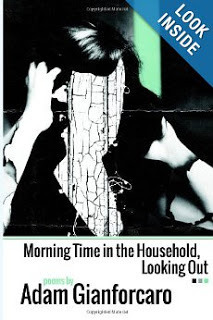
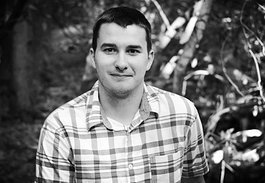
Field Recordings welcomes Adam Gianforcaro to the internet wilds.n His newest book is available via Aldrich Press. As usual, links to his work is peppered throughout.
Name:
Adam Gianforcaro
Most recent title published:
Morning Time in the Household, Looking Out published through Aldrich Press.
Where do you write?
If poetry, I usually draft in my moleskin that I keep in my pocket or on my cellphone, then I revise and flesh it out later. If fiction, I usually write while lounging on the couch.
What are your rituals with regards to writing
I actually don’t have any rituals.
Describe your writing process:
1) Open laptop; 2) Write; 3) Revise; 4) Revise; 5) More revision; 6) Send it away; 7) Wish I revised more.
What do you when you begin to revise? What's the first thing you do during that process?
As soon as I finish my first draft, I automatically think that whatever slop I had been written is the best piece I’ve ever created. Upon first read-through, though, I think just the opposite. Then, I go to town. I print out the piece and, also, have an electronic version up on my screen. I read through the physical sheet and destroy it with a red pen while I make clean changes in a word-processor.
When revising, how many drafts do you go through before you feel comfortable with the final product?
In poetry, I usually go through about 3 or 4 before I put it aside, because if I don’t put it aside, I will always feel that it could use more work. With fiction, I revise 5, 6, 7+ times.
When arranging lines for your poems, what do you consider at the micro level-- about the line?
It all depends, but I will not end a line with a conjunction or preposition.
As a poet, whose music, or voice, sometimes do you hear as you write or revise? When I write, I try to listen to a lot of instrumental music as to not get distracted with others’ words. My current favorites for writing are Toe and Mermonte.
How would you classify your poetry?
Realist free-verse with a hint of pessimism.
What poets are you currently reading?
This week, I read A Working Girl Can't Win by Deborah Garrison and Master of Disguises by Charles Simic.
What poets/poems do you strongly recommend a reader to discover?
Billy Collins, Charles Simic, and Charles Bukowski.
The contemporary American poetic tradition is elegy, do you discover elegiac qualities among your own writing as a whole? Are you a poet of loss?
In a sense, yes; death is the ultimate unknown and the most interesting concept to write about.
Where does your inspiration come from (music, film, other books)?
To give a simple answer, daily life.
What is your literary guilty pleasure?
I feel that poetry is my guilty pleasure... Is that bad?
Explain how your local and regional environment influences your writing, your process, and your product (in other words, how does your reality intersect with the worlds that you create?):
My local reality greatly influences my work. Many of my poems are loosely based on people I have met or experiences I have lived. Some poems are even about people I have only met once for a short amount of time.
You have to invite three authors to dinner, who are they? Why?
Paul Auster (my favorite novelist), Kurt Vonnegut (to pick his brain), and Billy Collins (my favorite poet),
Favorite title (you wish you had come up with):
Play the Piano Drunk Like a Percussion Instrument Until the Fingers Begin to Bleed a Bit, by Charles Bukowski
Book you did not read in high school but now have read and have an appreciation for: And why:
Middlesex by Jeffrey Eugenides. It put me on a path to rejecting gender binary.
Favorite word:
Lapel
Least favorite words: Any racial, homophonic, or other ignorant rhetorical.
Advice you would like to pass on to other writers:
Revise, revise, revise, and befriend simultaneous submissions.
What you would discuss with your pet if your pet could talk:
Discuss the need for him to chill out when I’m trying to relax.
Published on September 14, 2013 03:05
September 13, 2013
Indie Author Spotlight: S.M. Boyce
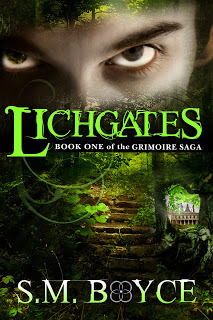
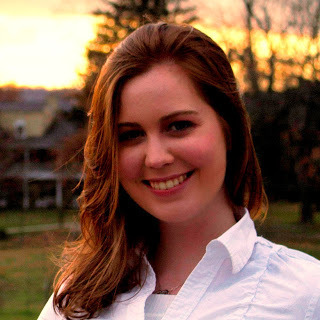
Field Recordings welcomes YA fantasy author, blogger, and twitter addict S.M. Boyce to the internet wilds. Links to connect with S.M.Boyce are scattered throughout the interview. A bit about her fantasy world is at the bottom for you lovers of fantasy.
Name: S. M. Boyce
Most recent title published: Treason (Grimoire Saga #2)
Where do you write?
My office desk, surrounded by my books.
What are your rituals with regards to writing (ex: Must have tea, a cat on the lap, etc)
I listen to a "trigger song" that gets me into the mood & mindset of the series I'm writing. The Grimoire Saga's trigger song is Unstoppable by E. S. Posthumus.
Describe your writing process.
I'm a plotter, which means I need to have a solid outline before I dive into a series. It helps me focus my attention on the story instead of what's coming next.
What do you when you begin to revise? What's the first thing you do during that process?
Actually, my husband and I have a great system. He reads the outline so he knows what's going to happen, and then he reads every chapter as I'm writing to look for plot holes, poor character motivation, and the like. After that, I comb through and send to beta readers, who give me similar feedback on the story as a whole.
When revising, how many drafts do you go through before you feel comfortable with the final product?
Anywhere from 3 - 7, usually. All depends on how well I'm connecting with the scene.
Where does your inspiration come from (music, film, other books)?
Life. There's so much beauty, mystery, and terror in our everyday lives that its a wonder we don't all walk around gaping at it all. I keep track of my favorite images/visuals in Pinterest. Some examples: my inspiration board, character swipes, creature swipes, and laughs/just for fun.
You have to invite three authors to dinner, who are they? Why?
Neil Gaiman, Nikki Jefford, and George R. R. Martin. Gaiman: so he can just talk, since he always has the most whimsical and inspirational things to say; Nikki, because she's a talented author who I want to finally meet in person; and Martin so that I can force him (somehow) to tell me how GOT ends.
Favorite title (you wish you had come up with):
I wish I'd written Coraline by Neil Gaiman. It's such a beautiful and dark book about courage, and finding your own inner strength. Wonderful book.
Line you wish you wrote:
"To the well-organized mind, death is but the next great adventure" - Albus Dumbledore, the Harry Potter series by J. K. Rowling
Book you did not read in high school but now have read and have an appreciation for: And why:
Little Women by Louisa Mae Alcott. It was required reading for some of my peers, but I never had to read it in my classes. After I found the free eBook, I gave it a shot and was surprised by how much I enjoyed hearing the story of four wonderful sisters growing up together.
Favorite words:
Love all, trust few, harm none. Shakespeare
Least favorite words:
"I can't"
Advice you would like to pass on to other writers:
You can't impress everyone. You'll go crazy trying and end up crying in a pile of balled-up paper. Write for yourself (and hire a damn good editor once you're done).
What you would discuss with your pet if your pet could talk:
Why he drags his darn toys out all over the house for me to trip on them. It's bugging me.
About the Grimoire Saga
Kara Magari is about to discover a beautiful world full of terrifying things—Ourea.
Kara, a college student still reeling from her mother’s recent death, has no idea the hidden world of Ourea even exists until a freak storm traps her in a sunken library. With no way out, she opens an ancient book of magic called the Grimoire and unwittingly becomes its master, which means Kara now wields the cursed book’s untamed power. Discovered by Ourea’s royalty, she becomes an unwilling pawn in a generations-old conflict—a war intensified by her arrival. In this world of chilling creatures and betrayal, Kara shouldn’t trust anyone… but she’s being hunted and can’t survive on her own. She drops her guard when Braeden, a native soldier with a dark secret, vows to keep her safe. And though she doesn’t know it, her growing attraction to him may just be her undoing.
For twelve years, Braeden Drakonin has lived a lie. The Grimoire is his one chance at redemption, and it lands in his lap when Kara Magari comes into his life. Though he begins to care for this human girl, there is something he wants more. He wants the Grimoire.
Published on September 13, 2013 03:00
September 12, 2013
Franetta McMillian's debut work, Love at the Time of Unraveling is Challenging Sci-Fi
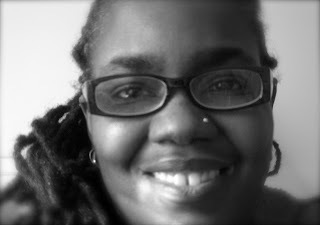
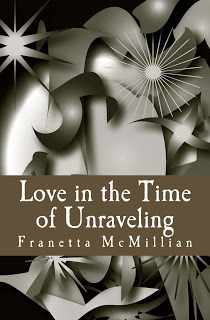
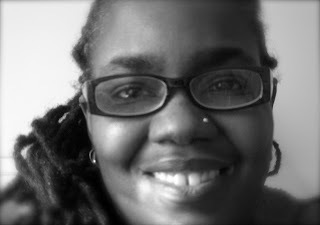
Field Recordings welcomes Mid-Atlantic author, Franetta McMillian to the internet wilds. I have had the pleasure of reviewing her debut novel for the Broadkill Review, a bi-monthly pdf literary journal out of Milton, DE. I'll post my review of the novel when the print and email version are available, but I will say that her debut work is fascinating. The novel, a collection of connected tales in an America ravaged by toxins, social poisons, and a caste system, is worth the read. McMillian's subject matter goes beyond the usual sci-fi entertainment. She's an author with something to say and a format to say it in. Links to McMillian's work is peppered througout.
Indie Author Spotlight:
Name: Franetta McMillian
Pen Names: Marta West, Bloody Mary's Cool Sister, Nezzra O' Possum
Most recent title published: Love in the Time of Unraveling
Where do you write?
Between my day job and family obligations (I'm one of the caregivers for my father) I rarely get any quiet time, so I do a lot of writing on the run. For prose I write on my Kindle, then use the computer to do a final draft. For poetry I start in longhand, then transfer to computer.
What are your rituals with regards to writing (ex: Must have tea, a cat on the lap, etc.)
The only thing I absolutely must have is silence -- or at least a decent wall of white noise that cancels out distractions. (I've done some of my best writing while sitting under the hair dryer). Many of the writers I know tend to be visual people, while I primarily hear my stories. Everything is music. So I can't have a lot of extraneous noise when I write. It's like trying to listen to several radios at once.
Describe your writing process:
Nothing mysterious. I do a rough outline, then fill in the holes.
What do you when you begin to revise? What's the first thing you do during that process?
I read my work aloud either to myself or to a willing friend. (Grown-ups still like a good bedtime story.) I also have the computer read my work to me. I had a writing teacher back in high school who told us that many people can't read faster than they speak -- they hear your words in their heads -- so you should strive to make your words sound engaging.
When revising, how many drafts do you go through before you feel comfortable with the final product?
It depends on the piece. Some things arrive almost fully formed; others you may have to rework a few times before you get what you want.
Where does your inspiration come from (music, film, other books)?
It depends...Love…. was inspired by many things, the most prominent of which was the Deepwater Horizon oil spill as well as the aftermath of Katrina. I was also recovering from a lengthy illness around that time, so that's in there, too. And I was reading Empire of Illusion by Chris Hedges (that's where Love's epigraph is from). It produced the most fabulous nightmares. The music for the voodoo ceremony in "The Prophecy of Mother M" was inspired by Elements of Light, a CD by The Bell Laboratory and Pantha du Prince. So inspiration comes from several sources.
Sometimes my muse is not a particular thing per se, but a creative challenge I give myself. A while ago I released Reveries of the Solitary Walker, a CD of spoken word. Most spoken word is based on rap's cadence, which I like, but my speaking voice doesn't lend itself to that type of performance. Why can't there be more spoken word like Laurie Anderson? I wondered. That's when my inner voice said, Maybe it's time for you to make some...
Explain how your local and regional environment influences your writing, your process, and your product (in other words, how does your reality intersect with the worlds that you create?):
My daily reality is fairly mundane. I make up worlds to entertain myself. Sure beats playing video games.
W/r/t to your latest book, your connected stories are engrossing, and hint at a world that could be explored in a big fat novel. Do you see yourself returning to this world? Which characters would you like to re-explore?
Love... is the first book of a series, which looks like it will be three books long. I don't really want to give too much away, but in the next installment, Mother M's prophecy starts to be fulfilled -- but not in the way everyone thought that it would. Almost everyone from Love... returns -- and there are some who are quickly mentioned in Love... (like Allison’s sister Etta) who will get fleshed out. The world of the Crescent and beyond is going to be a difficult world to leave.
Voodoo, Catholicism, bio engineering, a deflated economy, a toxic wasteland, these are heavy handed ideas or concepts that mingled very naturally together in your novel, discuss how it all connects for you in your mind:
My characters spoke, and I followed...
I realize Love... is a topical work and could have gotten very preachy. But I didn't want to merely write a novel of ideas. That would have made the book insufferable. I began with my character's voices and let them tell their stories in all their shades of gray.
I had an English teacher in high school who told me you could write about anything, no matter how heavy-handed or divisive as long as you told a compelling story. So I trusted my characters to reveal the world in which they were living without having a pre-formed agenda one way or another. I was willing to let them change my mind.
Do you see hope in the future?
It depends. Do I believe humankind will keep muddling along for a while? Yes, we are incredibly adaptive and resilient. But how well will we live? The answer to that is up for grabs. Some days I'm more optimistic than others.
Who is your favorite character from Love...? Why?
I like them all (or they wouldn't have made the cut) but if I had to choose, I'd say it's between Magdalene Ocantu ("Mother M") and Lillian Ruby. I like Magdalene because she's an Amazon hacker priest who speaks five languages and plays a mean piano. My idea of superwoman. What's not to love? I like Lillian Ruby because he's going to be a very interesting character to untangle. Is it possible to be as wealthy as he is and still remain a good man? I'm sure he's wondering that too.
Which character do you see yourself in?
Morian Watts, the ghost charmer in Destination Hill. Like her I've survived a serious illness and it has changed me in ways I still don't fully understand. I can't hear voices from the graveyard, but the experience has made me at once more humble and fearless. When you've had a taste of your own frailty, you waste less time.
You have to invite three authors to dinner, who are they? Why?
I would be scared to invite a bunch of my favorite writers to dinner because I've discovered so many of us are much taller in print. A writer and his/her work are two different things. But that said...Oh my. Only three?
Let's see...
Walter Mosley...because I've read almost everything he's written and it's all interesting. That doesn't mean he's always entirely successful, but he's always worth finishing.
Nikki Giovanni and Walt Whitman...because they yanked me out of my tediously obscure T. S. Eliot/ Ezra Pound phase.
Naomi Klein and Amy Goodman...because they are fearless women who say what they mean.
Oh pooh! That's five isn't it?
Favorite title (you wish you had come up with):
When Lilacs Last in the Dooryard Bloom'd by Walt Whitman. A teacher read this poem out loud in high school and it still makes me jealous.
Line you wish you wrote: There are so many...
Book you did not read in high school but now have read and have an appreciation for: And why:
I was supposed to read Atlas Shrugged during the summer of my sophomore year in high school, but as soon as I eyed its 1000-plus pages, I decided not to ruin my vacation with it and went with the Cliff Notes instead.
So I didn't read Atlas Shrugged until a few years ago. I don't agree with Rand's philosophy, but I did have a chance to see why it continues to seduce people. It's good to read stuff that you know is going to make you angry every once in a while. Parts of Atlas are very well-written, especially when you remember that English wasn't Rand's first language.
But the book still contains what I consider to be the second most hateful passage in American letters.
Favorite words:
Too many to list.
Least favorite words:
It's not the words themselves, but the usage of them. Like "status" used as a verb. You hear that a lot in business speak and it really grates on me. Another business quirk is using the word "opportunity" when what you mean is "problem" or "challenge". I realize the power of positive thinking, but that's just wrong. Finally there's the word "partner" to describe someone's spouse or significant other, especially in the case of a same-sex relationship. I understand the sentiment, but "partner" is such a clunky sounding word and it gets confusing when used in a more professional context. Like when journalist Glenn Greenwald's partner was recently detained in the UK, I wasn't sure what people meant. Did authorities detain his research assistant or what?
Advice you would like to pass on to other writers:
Start. Later you might have to tear up what you've written and start over, but you won't have anything to work with if you don't sit down and begin.
What you would discuss with your pet if your pet could talk:
I haven't had a pet for a long time, and when I did, I had tropical fish. They're rather vain and don't listen to anything you tell them.
One more question: what does your haz suit look like? Describe it for the readers.
It depends on who's wearing it and how much it costs. The ones that fit over your clothes resemble a biohazard suit, except the headgear is not as large. If you have the body for it (as well as the funds) you can wear one of the stand-alone ones which fit like a unitard with close-fitting, but flexible headgear. On the back of the neckband there is a small box which contains controls that regulate temperature and air filtration as well as any other fancy bells and whistles you may have ordered. If you live Outside, your gear is the first thing people see and is your single largest investment besides food and rent, so they can get very flamboyant. Outsiders have tricked out suits like people today have tricked out cars.
Got to ask: how do you see this book, a novel or short story collection?
As a novel, the first movement in a grand symphony.
Published on September 12, 2013 08:16



